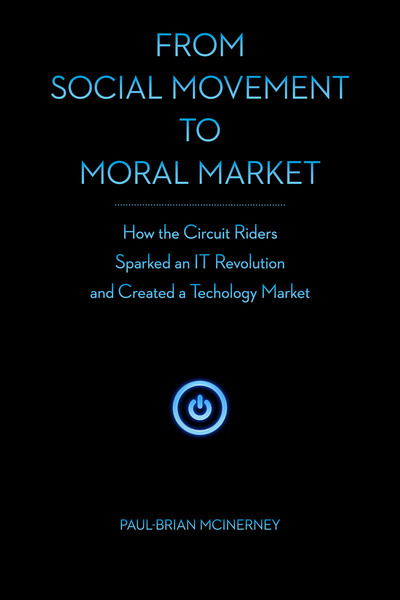
2014
256 pages.
$95.00
Hardcover ISBN: 9780804785129
Ebook ISBN: 9780804789066
In From Social Movement to Moral Market, Paul-Brian McInerney explores what happens when a movement of activists gives way to a market for entrepreneurs. This book explains the transition by tracing the brief and colorful history of the Circuit Riders, a group of activists who sought to lead nonprofits across the digital divide. In a single decade, this movement spawned a market for technology assistance providers, dedicated to serving nonprofit organizations. In contrast to the Circuit Riders' grassroots approach, which was rooted in their commitment to a cause, these consultancies sprung up as social enterprises, blending the values of the nonprofit sector with the economic principles of for-profit businesses. Through a historical-institutional analysis, this narrative shows how the values of a movement remain intact even as entrepreneurs displace activists. While the Circuit Riders serve as a rich core example in the book, McInerney's findings speak to similar processes in other "moral markets," such as organic food, exploring how the evolution from movement to market impacts activists and enterprises alike.
About the author
Paul-Brian McInerney is Assistant Professor of Sociology at the University of Illinois at Chicago. His research focuses on economic and organizational sociology, social studies of technology, social movements and collective behavior, and qualitative methods.
"McInerney presents a rich qualitative case study that follows the emergence of a market for non-profit technology consulting services . . . This book is written for a sociological audience, for which it builds a valuable theoretical bridge between political and economic sociology by adopting the lens of contemporary social movement theory to explore activists' role in shaping new market opportunities . . . McInerney's account provides a number of novel insights that should prove inspirational to scholars approaching this subject from diverse disciplines."
—Mary-Hunter McDonnell, Administrative Science Quarterly
"From Social Movement to Moral Market opens the black box of how social movements shape and are shaped by economic institutions . . . The book is a timely addition to current scholarship at the intersection of organizations and social movements that examines important questions about how social values are infused into and alter markets . . .There is much to love about this book. In particular, it is a compelling and rich narrative about the emergence of social enterprise from a social movement and it raises a number of questions that can be an impetus to further research . . . Academic researchers interested in the dynamic relationship between movements and markets will no doubt find this book valuable."
—Shon Hiatt and Jake Grandy, Organization Studies
"From Social Movement to Moral Market offers a great analysis of how values shape economic institutions, looking at what happens to a market when movement activists enter and try to change it. A strong contribution to the vibrant field of economic sociology."
—Fabio Rojas, Indiana University and author of From Black Power to Black Studies: How a Radical Social Movement Became an Academic Discipline
"This is an exceptionally engaging account of how the visible hands of activists power the creation of markets. It suggests that the very success of activists in imbuing markets with their values also presages their demise and, thereby, presents an important lesson for all economic sociologists."
—Hayagreeva Rao, Atholl McBean Professor of Organizational Behavior and Human Resources, Graduate School of Business, Stanford University
"Paul-Brian McInerney demonstrates how market activists resolve the tensions between the demands of the market and the values and morals that give meaning and authenticity to their work. This highly original book serves as a valuable bridge between social movement theory, economic sociology, and technology studies."
—Brayden King, Kellogg School of Management, Northwestern University